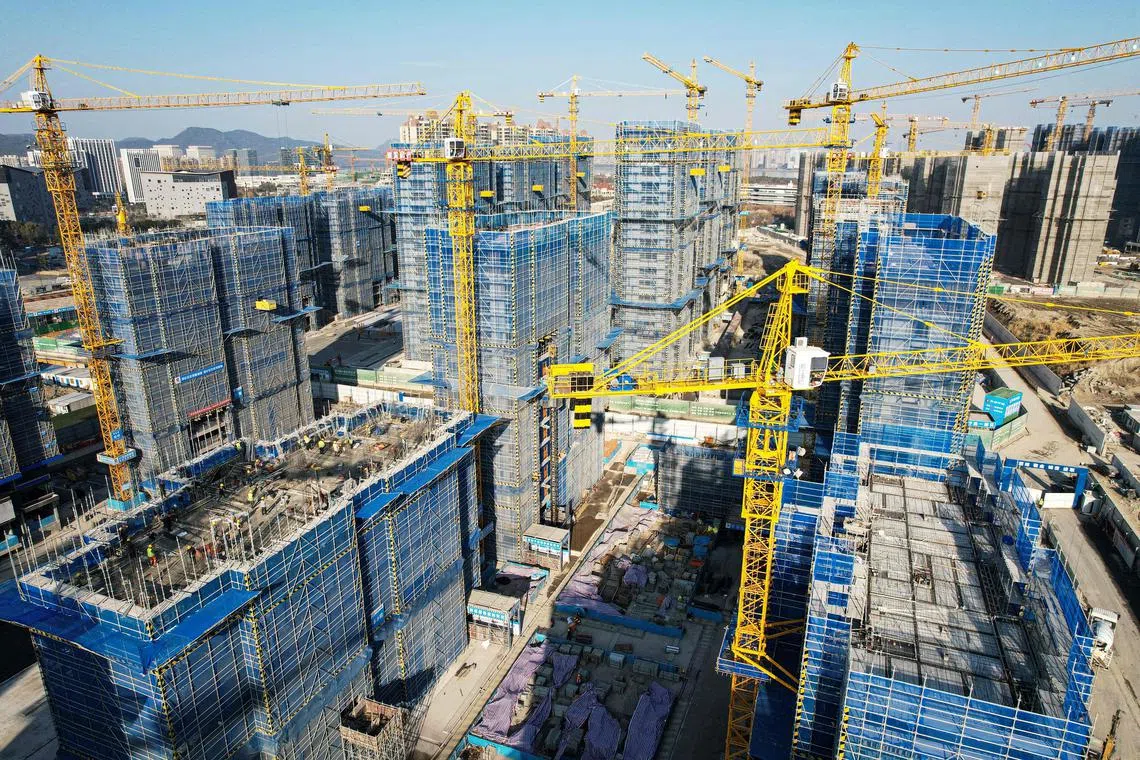China’s drive to grow 5% in 2024 starts with uneven showing
Sign up now: Get insights on Asia's fast-moving developments

The slump in China's property market was the main drag on growth.
PHOTO: AFP
BEIJING – China’s bid to hit a growth target of around 5 per cent in 2024 is off to an uneven start, with a strong rebound in factory output and investment but a slowdown in consumption growth in January and February.
Its keenly watched property slump also continued in February, with sharp declines in real estate investment, new home sales and construction starts, according to data released on March 18.
Analysts warned that the deepening real estate slide in the world’s second-largest economy might overshadow the gradual pick-up in other sectors.
Overall, the “data release showed mixed messages”, said Dr Zhang Zhiwei, chief economist at Pinpoint Asset Management in Hong Kong.
“The key issues on my mind are when the property cycle will stabilise, and how quickly the fiscal spending will pick up,” he added.
China’s latest raft of data – which includes figures for January and February – is the first major indicators of its economic health since Premier Li Qiang announced the 2024 growth target
China usually releases figures for January and February together to smoothen out the economic effects of the country’s largest holiday, the Chinese New Year break, when most factories and shops are closed.
According to the National Bureau of Statistics, the growth in factory output gathered pace with a 7 per cent expansion in the first two months of 2024 – higher than the 5 per cent and 5.2 per cent economists expected when polled by media outlets Bloomberg and Reuters.
The figure, which grew on the back of stronger export demand, was higher than the 6.8 per cent expansion recorded in December 2023, marking the highest rate of increase in almost two years.
Investments in fixed assets – a marker for government spending – rose 4.2 per cent in January and February, higher than the 3.2 per cent projected by both Bloomberg and Reuters.
For the whole of 2023, investments in fixed assets grew 3 per cent.
But growth in retail sales, an indicator for consumption, slowed to 5.5 per cent, down from the 7.4 per cent recorded last December. The latest growth in retail sales was largely in line with Bloomberg and Reuters polls.
The slump in the property market was the main drag on growth.
Investments in the first two months of 2024 fell 9 per cent, and new home starts plunged by 30 per cent, compared with the same period in 2023.
Sales of new homes, in terms of value, also decreased by 29 per cent in January and February, from a year ago.
The jobless rate crept up 0.1 percentage point to 5.3 per cent in February, though it is 0.3 percentage point lower than the rate recorded in the same month in 2023.
Global economists Larry Hu and Zhang Yuxiao of financial services firm Macquarie Group in Hong Kong said in a note that external demand and new energy, the main driver of gains in factory output, have bought Beijing time to fix its property sector.
But they highlighted risks to the Chinese economy, namely growing trade tensions as more countries grow wary of China exporting its excess capacity and the worsening property crisis, given that its policy responses have been largely “inadequate and reactive”.
“(China’s) policymakers will watch the property market very closely, as it’s not only the biggest drag on the Chinese economy, but also the biggest source of financial risk,” they said.
The International Monetary Fund expects China’s economy to grow 4.6 per cent in 2024, while the World Bank projects growth of 4.5 per cent.
Economists said China’s 2024 target will not be easily attained, barring strong policy support from Beijing.
In 2023, China grew 5.2 per cent, surpassing its aim of around 5 per cent, buoyed by the low base in 2022 due to Covid-19 curbs.



